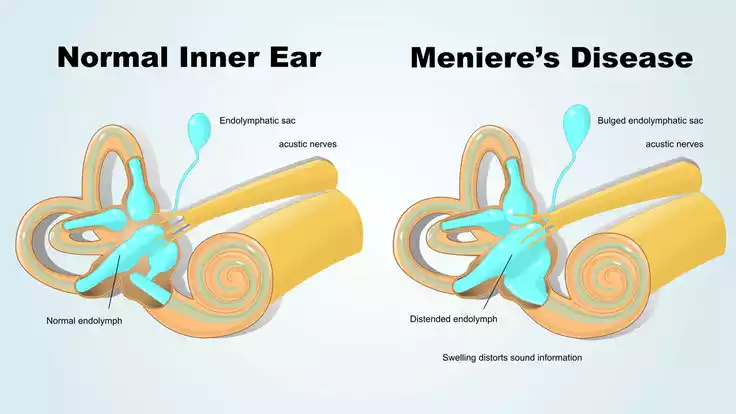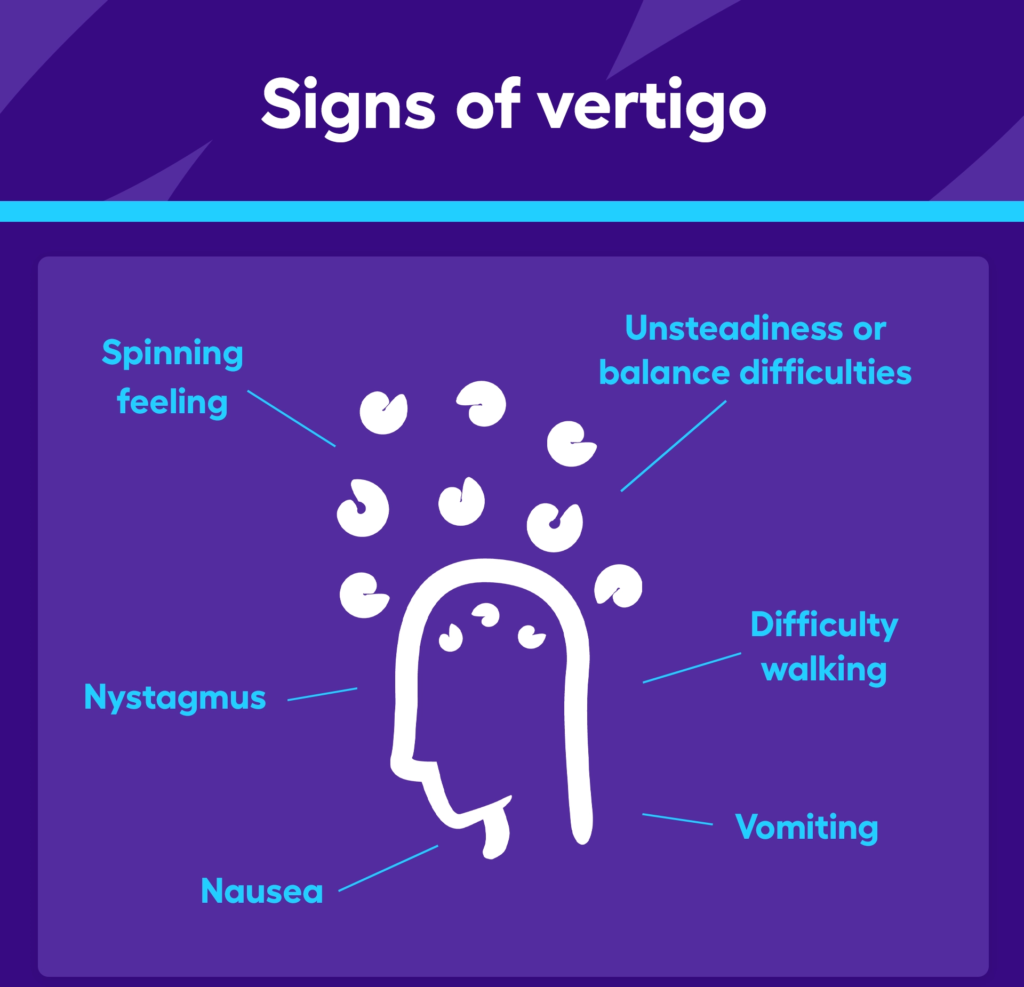This blog explains the best homeopathic remedies for vertigo, its causes, symptoms, risk factors, and complete treatment.
Vertigo is a common symptom experienced by people who have a problem balancing themselves due to underlying medical conditions.
Benign paroxysmal positional vertigo (BPPV) is one of the most common conditions that cause vertigo.
Vertigo is a sudden sensation that the environment around you is spinning in a circle or that the inside of your head is spinning.
In (BPPV) Benign paroxysmal positional vertigo, the Vertigo is usually triggered by specific changes in the position of the head. This might occur when the head is tipped up or down, when one lies down, or when one turns over or sits up in bed.
Although BPPV can be troublesome, it is rarely serious except when it increases the chance of falling. One can receive effective treatment for BPPV with homeopathy.
Vertigo Types
There are two main types of vertigo :
- 1)Peripheral vertigo:-It is the most common type of vertigo. Peripheral vertigo is caused by an error in areas of the inner ear or some disorder in the vestibular nerve, it is the nerve that connects the inner ear and the brain.
- 2)Central vertigo:-Central vertigo occurs when there is a glitch in the brain tissue, particularly in an area of the brain called the cerebellum that is responsible for balancing the body.
Vertigo Causes
BPPV (Benign paroxysmal positional vertigo):-
It occurs when tiny Calcium particles also known as canaliths are dislodged from their normal location and collect in the middle ear. The middle ear sends signals to the brain about head and body movements relative to gravity. It helps you keep your balance.
Commonly, BPPV often occurs due to minor to a severe blow to your head. Less commonly BPPV occurs due to disorders that damage the inner ear.
Very rarely, BBVP occurs due to damage that occurs during the ear surgery or due to long periods positioned on your back, such as in a dentist’s chair. BPPV is also associated with migraines disorders.

Meniere’s disease: –
It is an inner ear disorder known to be caused by fluid being buildup and some conditions causing changing pressure in the ear. It can cause episodes of vertigo along with ringing in the ears known as tinnitus and also hearing loss.

Vestibular neuritis or labyrinthitis: –
Inside your ear is a tiny organ called the vestibular labyrinth. It is a structure with three loop-shaped structures or semicircular canals, that contain fluid and fine, hairlike sensors that monitor or control the rotation of the head.
This Vestibular neuritis or labyrinthitis is an inner ear problem usually related to infection mostly viral. The infection causes an inflammatory process in the inner ear and around nerves that are important for helping the body sense balance
Otolith organs: –
These are the structures in the ear that monitor the head movements like moving right and left, up and down, or back and forth and also the position of the head related to gravity.
These otolith organs contain crystals that make one sensitive to gravity.
Rarely vertigo can be associated with:
- Some injuries to the head or neck
- Any brain-related problems like stroke or tumor
- Some medications that cause ear damage
- Migraine headaches
Risk factors for Vertigo
- Benign paroxysmal positional vertigo(BPPV) occurs most commonly in people of age 50 and older, so it is this age group that is more at risk of getting Vertigo
- BPPV is more common in women than in men.
- Any head injury or any other disorder of the balance organs of one’s ear may make one more vulnerable to getting BPPV leading to vertigo.
Complications of Vertigo
- Although BPPV is uncomfortable, it rarely causes complications. The dizziness of BPPV can make you unsteady, which may put you at greater risk of falling.
- Symptoms of vertigo are rarely caused by a serious, life-threatening condition.
One should visit your doctor immediately or seek emergency medical care if you experience any of the below-listed complications
- A new severe headache
- Loss of hearing
- Loss of vision or Double vision
- Fever
- Sudden loss of consciousness
- Numbness or tingling in the extremities
- Difficulty in walking
- Coordination loss
- Continuous vomiting or inability to keep food down
Vertigo Symptoms
Symptoms of vertigo vary from one person to another. The symptoms can be mild or severe, it usually depends on what is causing the Vertigo issue.
Common signs and symptoms that occur in cases of Peripheral Vertigo are:
- Dizziness in which there is the overall feeling of being unbalanced
- There is a sensation like you are spinning or moving
- One has problems focusing the eyes in skilled work
- There is loss of hearing in one of the ears
- When walking or standing there are balancing problems
- Tinnitus -there is a ringing sound in the ear
- Sweating might be seen in some cases
- Few people will experience Nausea or vomiting
Signs and symptoms of Central Vertigo are:
- There is a Double Vision
- One may have difficulty swallowing food
- There might be Facial paralysis
- Difficulties in eye movement
- Speech may get slurred
- There is weakness in the limbs
- Pain in head
- General fatigue and weakness of the body
- The patient gets sensitive to light

Diagnosis of Vertigo
Vertigo is usually diagnosed based on the history of pain on one side of your head, any trauma in the past, or any underlying disorder leading to Vertigo.
Diagnosing vertigo is not always easy.
In reality, it can be tricky and will need a process, because people with dizziness often have trouble describing their specific symptoms.
Vertigo is very similar to dizziness but there is a differentiating factor in both the symptoms.
In dizziness, there is an overall feeling of being unbalanced while with vertigo, you have a sensation that you’re moving or that your surroundings are spinning.
Your doctor will find out if you have true vertigo by asking specific questions related to some specific complaints.
After that the focus will be on finding the cause, your doctor may enquire about your family and medical history, perform a physical exam, and conduct various tests.
Whenever needed they might perform a maneuver test with you, called the Dix Hallpike maneuver, to again re-create vertigo symptoms.
If this test is positive, it is diagnostic of peripheral vertigo.
Certain physical examinations will be conducted to measure your balance, and careful analysis of eye movements and assessment of what side of your body is affected by vertigo will be done.
Image testing like Computerized Tomography (CT) scan or Magnetic Resonance Imaging(MRI) can be advised by your doctors to see what’s going on inside your body.
In a few cases, hearing tests, vision tests, and total blood count can be asked to be done, every person might need a different set of tests depending on the causes and history narrated.
A general practitioner may refer you to a specialist, like an otolaryngologist or a neurologist these are specialists who focus on inner ear or balance problems, visiting specialist will aid in diagnosing or treating your condition.
Rotary tests or rotary chair test tests to diagnose dizziness are also based on the measurement of eye movements.
Posturography or computerized dynamic posturography is a test based on the measurement of one’s ability to maintain the state of balance while standing.
Vestibular-evoked myogenic potentials test(VEMP)- This test is done to measure how certain muscles react to sound. It can detect if there is any problem in the inner ear.
Hearing tests- Since many cases of Vertigo are due to problems in the inner ear, one may undergo one or more hearing tests to diagnose the cause of dizziness one of the symptoms of vertigo.
Prognosis of Vertigo
Symptoms of vertigo will resolve on their own within a few days in the majority of cases.
In chronic cases living with vertigo can be frustrating, the episodes may be unpredictable on some days, and you may not have any symptoms on other days, while on a few days, you might have debilitating attacks of dizziness. Hopefully, there are effective treatment options like Homoeopathy, and most of the time, these treatments can help you control or eliminate or minimize your symptoms, so you can enjoy your everyday activities.
Vertigo Management
Several treatment options are available to reduce or control symptoms of vertigo.
The Canalith Repositioning Procedure which is also known as the Epley maneuver is a well-known therapy that involves exercises to reposition canaliths -calcium crystals in the inner ear, this procedure has a success rate, in helping people with the most common cause of vertigo.
Few other types of physical therapy can also be used to relieve vertigo caused by inner ear problems.
In a few cases medicines, injections, psychotherapy, or surgery are advised. The doctor handling your case can help you decide which options are best for you.
Medication Options
Few commonly used medications in the treatment of vertigo symptoms are:
- Dramamine
- Antivert
- Valium
Home care for vertigo
Your doctor may be able to provide you with detailed instructions for doing modified repositioning exercises, like the mentioned Epley maneuver, at home.
Changing the diet and eliminating foods that are salty, sugary, or high in caffeine can improve the symptoms.
Drinking adequate water daily for good hydration is another way to help overcome vertigo.
Dietary supplements, like ginkgo Biloba extract, have been shown to improve symptoms.
Daily yoga, tai chi, relaxation techniques, and adequate sleep might help in improving balance and ward off an episode of vertigo. One should talk to your doctor before opting for home remedies.
Prevention of Vertigo
Mostly, vertigo cannot be prevented.
But knowing and avoiding certain risk factors may help in preventing them. For instance, one can protect oneself from any kind of head injury by wearing a helmet when bicycling or playing sports or taking measures to prevent a fall.
Best Homeopathic Remedies for Vertigo
1. BRYONIA– Vertigo with gastric disturbance
Symptoms
Bryonia Alba is a valuable homeopathic remedy indicated for vertigo associated with gastric disturbance. Individuals who benefit from Bryonia may experience dizziness and a sensation as if everything is turning in circles, particularly when there is an underlying gastric issue.
This vertigo may be exacerbated by any movement, even the slightest, and can be accompanied by nausea and vomiting. The gastric symptoms often include a dry, parched mouth, extreme thirst for large quantities of water, and a bitter taste. The person may find relief from lying still and avoiding any motion.
Mentally, individuals requiring Bryonia may exhibit irritability, desire for solitude, and a preference for remaining undisturbed.
30 CH Potency,4 globules three times a day is used. Gradually, one can increase the potency depending upon the case’s progress.
2) COCCULUS INDICUS-For Vertigo due to motion-sickness
Symptoms
Cocculus is a homeopathic remedy for vertigo useful if you suffer from vertigo problems while sitting or riding in a moving car or any other vehicle.
It is indicated in vertigo condition that comes on with nausea, vomiting, and an empty feeling in the head, it can give great relief.
200 CH Potency,4-8 globules daily ones are used. Gradually, one can increase the potency depending upon the case’s progress.
3) GELSEMIUM-For Vertigo with dimness of vision
Gelsemium is a very effective homeopathic remedy for vertigo.
It is indicated when one suffers from dizziness, heaviness of eyelids, dimness of vision, and headaches.
It gives complete relief to the symptoms of vertigo, it is recommended when vertigo begins from behind your head and spreads all over.
Potency & dosage
30 CH Potency,4 globules three times a day is used. Gradually, one can increase the potency depending upon the case’s progress.
4) PHOSPHORUS-For Vertigo with great sensitivity to light
Symptoms
Phosphorous is a great remedy for vertigo treatment, especially for people who are more than 60 years of age.
It is indicated in symptoms that take place when the patient gets vertigo on waking up in the morning.
It is of great importance in treating vertigo with the overall feeling of whirling, fainting, and floating.
It is suited for people who feel relief in the dark, their eyes are very sensitive to light, when they take this remedy, their condition can improve to a great extent.
Potency & dosage
30 CH Potency,4 globules three times a day is used. Gradually, one can increase the potency depending upon the case’s progress.
5) PULSATILLA -For Vertigo that occurs due to irregular menses
Symptoms
Pulsatilla is used by many homeopaths in treating vertigo in women who have delayed menstrual cycles.
It acts best towards preventing the feeling of moving objects during the vertigo episode.
It also helps in stopping nausea that occurs frequently because of the condition.
30 CH Potency,4 globules three times a day is used. Gradually, one can increase the potency depending upon the case’s progress.
6) BELLADONNA-For Vertigo from exposure to cold
Symptoms
Belladonna is a top-listed medicine for treating acute Vertigo when the condition worsens with every change of position.
It is indicated in conditions when the person shows the tendency to fall to the left side or backward.
It is indicated when Vertigo is accompanied by an acute headache and the patient gets relief by applying pressure or binding the head, and the body may experience excessive heat.
Potency & dosage
30 CH Potency,4 globules three times a day is used. Gradually, one can increase the potency depending upon the case’s progress.
7) CHINA -For Vertigo with loss of blood or fluids
It is one of the top-grade remedies for vertigo in patients after the loss of blood or after the loss of fluids as in diarrhea.
Vertigo due to anemia is well corrected by using this remedy.
It is indicated in vertigo with a feeling of weakness, dizziness and walking also are difficult, China will act towards making for the loss of body fluids and reducing the symptoms of Vertigo.
Potency & dosage
30 CH Potency,4 globules three times a day is used. Gradually, one can increase the potency depending upon the case’s progress.
8) CONIUM MACULIATUM:-For Vertigo due to old age
Conium is one of the top listed medicine for the treatment of vertigo in elderly people.
The motion of the head sideways worsens the condition of vertigo making the person fall.
It is indicated when the person feels as if he is moving around in a circle, the Vertigo episode may also get aggravated by motion in bed.
Potency & dosage
30 CH Potency,4 globules three times a day is used. Gradually, one can increase the potency depending upon the case’s progress.
9)ARNICA-For Vertigo due to trauma
Arnica is a wonderful remedy for treating vertigo that occurs due to a history of any injury to the head either by a blow on the head or some trauma.
It is indicated when the person feels dizziness or headache.
The person is restless and lies down but the surface on which he lies down seems to be too hard for him.
Potency & dosage
30 CH Potency,4 globules three times a day is used. External application of ointment along with internal medicine is advisable.
10) FERRUM METALLICUM -For anaemic Vertigo
Symptoms
It is indicated for vertigo due to anemia which worsens due to suddenly rising from a sitting or lying position.
It is indicated when vertigo comes on when going downhill or crossing water, even though the water is smooth.
Potency & dosage
30 CH Potency,4 globules three times a day is used. Gradually, one can increase the potency depending upon the case’s progress.
Remember that homeopathic remedies should be prescribed based on individual symptoms and characteristics. It’s crucial to consult with a qualified homeopath for proper evaluation and personalized treatment. Homeopathy focuses on treating the whole person, so a detailed case study is necessary to select the most appropriate remedy.
Homeopathic medicines should be taken only when prescribed by a homeopathic physician. Self-medication may aggravate the original conditions.


